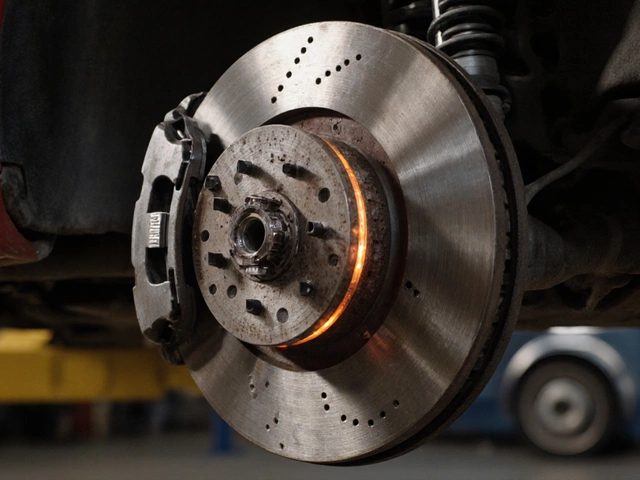Ever wondered how long engine oil can sit in your car's engine before it's no good? You're not alone. For most of us, oil changes seem like a routine chore, but understanding oil longevity can actually save you from costly engine repairs.
First off, engine oil isn't immortal. Whether you're dealing with a barely-used vintage car or just haven't driven much lately, oil sitting idle can break down over time. Generally, oil can sit in an engine for about six months to a year without causing any harm, but that's just a ballpark estimate. Lots of factors play into this, like the type of oil you're using and the environment your car's exposed to.
Curious about what speeds up that degradation process? Temperature changes, moisture, and even frequent short trips can all take a toll. But don't worry—we'll get into that and more, plus how to check your oil's condition, in the sections to follow. So, stick around; you might pick up a thing or two about keeping your engine in top shape!
- The Basics of Engine Oil
- Shelf Life of Unused Oil
- Factors Affecting Oil Degradation
- Testing and Checking Oil Quality
- Signs It's Time for an Oil Change
- Tips for Maximizing Oil Longevity
The Basics of Engine Oil
Engine oil is like the lifeblood of your car. It reduces friction, cools down the engine, and prevents wear. But not all oil is the same; in fact, picking the right type is pretty crucial for your engine's health.
Types of Engine Oil
There are generally three types of engine oil: conventional, synthetic, and synthetic blend. Conventional oil is the most basic form, derived straight from crude oil, and it’s great for older car models. Synthetic oil, on the other hand, is chemically engineered and offers better performance, especially in extreme temperatures. If you're looking for something in between, synthetic blend is a mix of both and offers a good compromise.
Viscosity and Its Importance
Viscosity is another biggie to consider. Essentially, it’s how thick or thin the oil is. You’ve probably seen numbers like 5W-30 on oil bottles. The 'W' stands for winter, and those numbers indicate how the oil flows at different temperatures. Lower numbers mean the oil is thinner and flows more easily in the cold. Getting the right viscosity ensures that the oil can protect engine parts effectively.
Engine Oil Classifications
In terms of quality, oil is classified by organizations like the American Petroleum Institute (API). Look for certifications on the bottle; they tell you about the oil’s performance level and whether it's suitable for your car.
How Oil Keeps Your Engine Healthy
Aside from reducing friction, engine oil also helps to keep your engine clean by picking up dirt and impurities. It even forms a seal between the pistons, rings, and cylinder walls, keeping your engine performing efficiently.
Using Oil Efficiently
Want to make sure you’re using oil efficiently? Keep an eye on your oil levels and look for any signs of degradation. A good habit is checking the oil every once in a while, especially before long trips.
Shelf Life of Unused Oil
So, how long does engine oil really last sitting around, doing nada in your engine? Well, it depends on a few key things. Usually, fresh engine oil can sit in an engine for about six months to a year and still be okay. But that's not a universal rule because some factors could shrink this period.
First, let's talk about the type of oil. Synthetic oil generally lasts longer than conventional oil. This oil's refined properties make it resist breaking down better over time, which means it's your best bet if you're looking to stretch that oil change interval a bit.
Another thing to keep in mind is the bottle's seal. If you're storing unused oil, keep it sealed, tightly shut, and preferably in a cool, dark place. Exposure to air, light, and heat can speed up its degradation. This means if you've opened a bottle and just left it sitting around, it might not last as long as you'd hope.
Environmental Impact
The surroundings can also affect the oil lifespan. If you're in an area with extreme temperature shifts, the oil in your engine could degrade faster. Hot climates might cause the additives in the oil to break down, while moisture in cold environments could lead to sludge formation.
Here's a quick tip: Always use fresh oil if you're planning to store your car for a long time. Older oil can gather contaminants and moisture, which can lead to corrosion inside the engine.
Special Cases
Some manufacturers have actually started providing oil with additives that extend shelf life. Check the label or consult your car’s manual to see if you're using such oil. These products can be a lifesaver, especially for seasonal vehicles like sports cars or motorcycles that don’t get much road time.
Factors Affecting Oil Degradation
When it comes to engine oil, time is just one piece of the puzzle. Several factors can speed up oil degradation, making it less effective over time. Understanding these can help you decide the right time for an oil change.
Exposure to Temperature Fluctuations
Temperature is a biggie. Oil isn't a fan of extreme temperature changes. If your car is parked outside and exposed to high heat or freezing cold, the oil can break down faster. The constant expansion and contraction lead to its deterioration, so it might be worth considering a garage or keeping your car covered.
Moisture and Contaminants
Moisture sneaks into the engine, especially if your car sits unused for long periods. This moisture can cause oil to become milky and less effective at protecting your engine. Also, contaminants like dust and dirt can enter oil when seals aren't tight, further degrading its quality.
Short Trips and Idle Time
Believe it or not, short trips where your engine doesn't heat up fully can also degrade oil. Oil needs to reach a certain temperature to burn off contaminants; otherwise, they just sit there, speeding up the breakdown process. So, if you're mostly doing short drives, your oil might go bad quicker than expected.
Oil Type and Quality
Not all oils are created equal. Synthetic oils often last longer than conventional ones due to their refined nature. If you're using cheap, low-quality oil, it's likely to degrade faster. Investing in a better oil might seem pricey upfront but pays off by extending your oil lifespan.
Knowing When to Change
Many car owners rely on the old 'three months or 3,000 miles' rule, but modern oils can last longer, especially synthetics. However, always pay attention to these factors and adjust accordingly. Saving a few bucks on an oil change isn't worth damaging your ride.
By keeping an eye on these factors, you can better maintain your car's health and make sure your engine oil stays strong and effective for as long as possible.

Testing and Checking Oil Quality
So, how do you figure out if the engine oil in your car is still good or has seen better days? The good news is, you don’t need a degree in rocket science to get it right. There are simple ways to test and check the quality of your oil, and you can do most of it yourself at home.
Visual Inspection
Start with a basic visual check. When you pull out the dipstick, look at the oil’s color and consistency. Fresh oil is usually amber and transparent, whereas oil that has deteriorated could be dark, murky, or even gritty. If it looks thick like molasses, it’s time for a change.
Smell Test
Next up, give it a whiff! If your engine oil smells burnt, it might be breaking down. That burnt smell can signal it's losing its efficiency in lubricating and cooling your engine.
Oil Quality Test Kits
If you want to be more precise, you can grab an oil test kit online or from your local auto parts store. These kits usually involve taking a small oil sample and sending it to a lab, where they'll check for contamination, acidity, and viscosity. It’s a bit more work, but can be worth it, especially if you've got an older engine you're not sure about.
Frequent Checks and Oil Life Monitoring System
If your car is a bit more on the modern side, it might come with an oil-life monitoring system. This tech can estimate how much life your oil has left based on your driving habits. But even so, performing manual checks now and then helps to have a backup opinion just in case the system says everything’s peachy when it’s really not.
Regularly testing and checking your engine oil is a small task with big payoffs. Keep your car's heart well-lubricated, and it'll keep purring along without a hitch!
Signs It's Time for an Oil Change
So, how do you know if it's time to swap out that engine oil? Ignoring these signs might have you facing a hefty repair bill down the line. Let’s break it down into some clear signs your engine oil is past its due date.
1. The Oil Smells Burnt
Ever catch a whiff of something burnt while driving? That’s a red flag. Burnt oil means it's lost its protective properties and could be damaging your engine from the inside out.
2. Unexpected Engine Noise or Knocking
Another big hint? That chorus of knocks and clatters coming from under the hood. Old oil can get thick and lose its lubricating abilities, leading to increased friction and some pretty alarming sounds.
3. Dirty or Gritty Appearance
Grab that dipstick and take a good look. If the oil looks grimy or feels gritty between your fingers, it's high time for a change. Clean oil is smooth and usually a translucent amber color.
4. The Oil Change Light is On
This might seem obvious, but hey, those warning lights are there for a reason. If your car's telling you it needs an oil change, better listen up! This alert often considers both time and mileage since the last change.
5. Lowered Fuel Efficiency
Notice your fuel economy going downhill? Sludgy, old oil makes your engine work harder, using up more gas than usual. Fresh oil reduces drag and gets those MPG numbers back to where they should be.
6. Increased Mileage
If you've driven a lot recently or just hit that three-month, 3,000-mile mark, it's probably smart to check on that engine oil. Modern vehicles have varying recommendations, but sticking to a regular schedule prevents any unpleasant surprises.
- Tip: Always follow your car manufacturer’s suggested service intervals.
These pointers aren't just for peace of mind—they're about keeping your car running smoothly. Don't underestimate what fresh, clean oil can do for your engine's health!
Tips for Maximizing Oil Longevity
If you want to make the most out of your engine oil and keep it fresh for as long as possible, you're in the right place. Here are some straightforward tips to keep that oil working its magic on your engine.
Regular Check-Ups
One of the easiest ways to ensure your oil isn't going bad is by giving it a frequent check. Try to pop the hood and take a look at the oil level and color every couple of weeks. Fresh oil tends to be amber and clear, while oil that needs changing will appear darker and might even have some debris.
Stick to a Routine
Even if you're not driving much, changing your oil every six months is a good rule of thumb. This schedule is just approximate, though. Depending on your car's model or make, you might need to adjust. Always refer to your vehicle’s manual for the manufacturer’s guidance.
Drive Smart
Think of your drives as little workouts for your car. Short frequent trips and stop-and-go driving can wear down the engine oil faster than you think. Try to consolidate errands into one trip, giving your engine a chance to reach the perfect temperature and maintain efficiency.
Store Your Vehicle Properly
If you're storing your car for a while, choose a spot that's dry and away from direct sunlight. Excess moisture and extreme temperatures are enemies of both the vehicle and its oil.
Consider Using High-Quality Oil
There’s a noticeable difference in lifespan and performance between conventional and synthetic oils. Using synthetic oil might be pricier upfront, but it lasts longer and can handle temperature variations better. Check this quick comparison in the table below:
| Type of Oil | Longevity | Temperature Resilience |
|---|---|---|
| Conventional Oil | 3,000-5,000 miles | Moderate |
| Synthetic Oil | 7,000-10,000 miles | High |
By following these tips, you'll not only increase the longevity of your oil but keep your engine purring for years to come. So, what's next? Time to put these tips into action and give your engine care a new level of attention!




